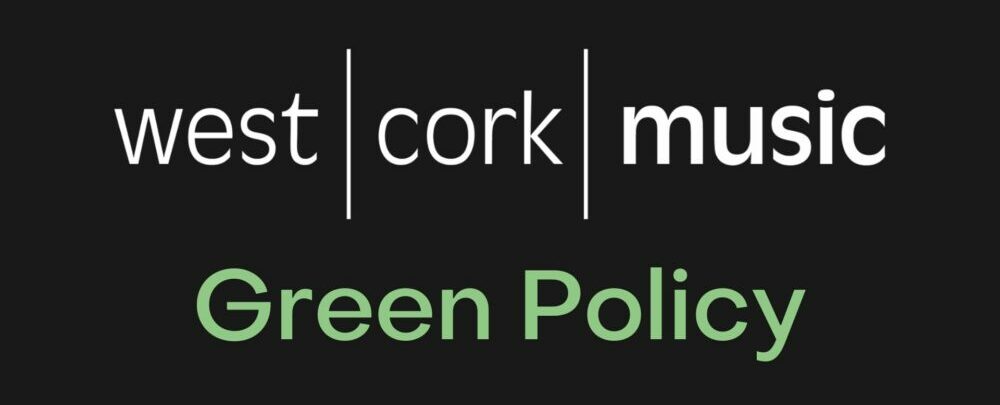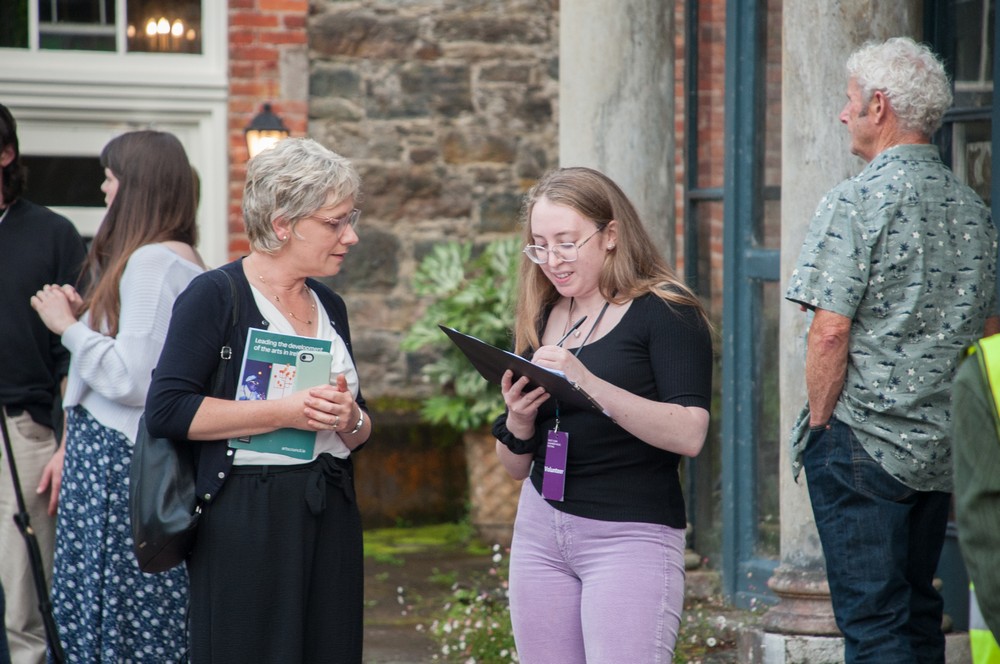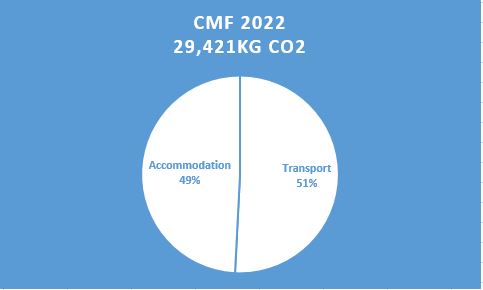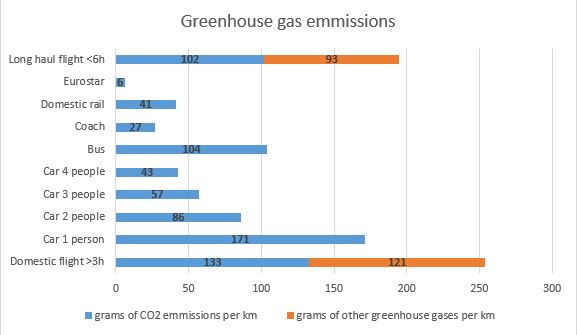

West Cork Music is committed to reducing the impact of our work on the environment, while maintaining high standards of artistic excellence and festival atmosphere. The production of three international festivals in a remote location has always been a major draw to artists and audiences, but also creates problems for sustainability. This policy aims to work with WCM staff, artists and audiences to collectively make WCM activities work in a more sustainable and environmentally friendly way.

Volunteer taking audience surveys

CMF 2022 emissions chart
The Climate Crisis and how to reduce the impact of WCM international festivals presents a unique set of problems. The location of the festivals in Bantry, a rural setting with poor transport infrastructure, is one such problem. Even where artists are resident in Ireland there will remain a significant carbon footprint due to travel, not only for artists but also for audiences. This is a problem that requires all stakeholders to be aware of and to commit to trying to manage by considering at the individual and group level how we can reduce this impact. For many artists and audience, flying is the only practical method of coming to Bantry, but everyone involved with the Festivals should aim to help us to reduce the impact of travel by thinking carefully about the most green friendly and sustainable way they can travel here and their impact on the local environment when they are here.
This policy is intended as a first step only in committing to reducing the environmental impact and will be added to and updated as new data, new options and new ways of thinking are developed.
“The old ways of thinking – defining success as endless growth and unsustainable levels of international travel – need to be made to disappear” – Scottish Classical Music Green Guide 2021.
The Climate Crisis does not allow for complacency and with the help of all stakeholders, the festivals will move to a greater degree of sustainability to try and reduce our. Creative Europe have already brought in a requirement for applicants to show how their proposal is making an effort on green issues, and the Arts Council of Ireland brought in requirements for Strategically Funded organisations to commit to Action Plans on this issue.
In 2019, WCM’s largest area of carbon emissions was travel for artists and volunteers to the Festivals.
Goal: Reduce Transport Emissions
Barriers:
Actions:
Discontinue sending private taxis to Dublin to collect artists, but request them to take public transport to Cork
Include questions about travel habits in audience surveys to raise awareness
Results: Between 2019 and 2023 transport emissions for artists dropped from 47,500kg to 35,700kg of CO2
Everyday habits – Are we asking the question: Is this sustainable/environmentally friendly?
Goal: Embed an awareness of sustainability throughout WCM, so that it is considered in everyday habits, decision making and programming, and becomes a central aspect of WCM brand.
Barriers:
Actions:
Raising awareness in our sphere of influence about the climate change and environmental issues
Goal: Keep the Green Policy as a living document and the issue of sustainability alive
Actions:
Audience travel emissions
Goal: Learn more about audience carbon footprint
Actions:
Embed sustainability and green habits
Goal: Increase awareness and encourage sustainable practices
Actions:
Links with other arts organisations
Goal: Work to develop practices across the arts
Actions:
Waste reduction and management
Goal: Reduce waste of non-reusable materials, such as publicity materials and catering materials
Actions:
Many thanks to everyone in the audience who took part in our surveys. It’s so useful to us to be able to understand our audience.
For the past few years we have included questions designed to understand the issues facing our Festivals in regards to sustainability.
Here are some key takeaways from the audience surveys
Get in touch if you would like to share your story on slow travel to the Festival, or have any useful tips.

Greenhouse gas emissions – transport
Taking public transport has less environmental impact than a private car by approximately 80%.
Even adding one more passenger to a car journey makes it more environmentally friendly than flying.
Most fuel is burnt at the take-off and climbing stages of flying (the first 250km approx.), and cruising uses less fuel than take off and climbing. Therefore, a single flight produces less emissions per kilometre than multiple short flights over the same distance.
If you have any useful tips for being green while at the Festival please let us know!
At the 2023 Chamber Music Festival, 2 musicians based in Amsterdam, Rebecca Wise and Jeanita Vriens from Ragazze Quartet, returned there from Bantry travelling by land and sea instead of flying, carrying their luggage and instruments (including a cello!)
Here you can see a direct comparison in the emissions created and the cost compared to a direct flight a day later from Cork to Amsterdam and all the stages of the journey.
The slow travel produces nearly 40% less emissions that even a direct flight, and is very close to the the same price!
The 2023 Chamber Music Festival exceeded its targets for reducing emissions. We would like to thank all the musicians, staff and volunteers for helping.
West Cork Music Environmental and Sustainability Policy_updated 2025 – Download the PDF.
West Cork Music Environmental and Sustainability Action Plan-updated 2025 – Download the PDF
Copyright © 2026 West Cork Music. All rights reserved.
Designed and developed by Matrix Internet